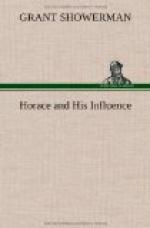In what we have said thus far of the dynamic power of Horace in literary creation, we have dealt with visible results. We should not be misled, however, by the satisfaction of seeing plainly in imitation, adaptation, translation, quotation, or real creation, the mark of Horatian influence. The discipline of the literary ideal in the individual, and the moulding of character in literature as an organism, are effects less clearly visible, but, after all, of greater value. If the bread and meat of human sustenance should appear in the body as recognizable bread and meat, it would hardly be a sign of health. Its value is in the strength conferred by assimilation. With all respect and gratitude for creation manifestly due to Horace, we must also realize that this is but a superficial result as compared with the chastening restraint of expression and the health and vigor of content that have been encouraged by allegiance to him, but are known by no special marks. It is no bad sign when we turn the pages of the Oxford Selections of Verse in the various modern languages and find but few examples of the visible sort of Horatian influence. To detect the more invisible sort requires the keen eye and the sensitive spirit of the poet-scholar, but the reader not so specially qualified may have faith that it exists. With Goethe writing of Horace as a “great, glowing, noble poet, full of heart, who with the power of his song sweeps us along, lifts us, and inspires us,” with Menendez y Pelayo in Spain defining the Horatian lyric, whether Christian or pagan, by “sobriety of thought, rhythmic lightness, the absence of artificial adornment, unlimited care in execution, and brevity,” and holding this ideal aloft as the influence needed by the modern lyric, and with no countries or periods without leaders in poetry and criticism uttering similar sentiments and exhortations, it would be difficult not to believe in a substantial Horatian effect on literary culture, however slight the external marks.
3. HORACE IN THE LIVING OF MEN
Let us take leave of these illustrations of the dynamic power of Horace in letters, and consider in conclusion his power as shown directly in the living of men.
First of all, we may include in the dynamic working of the poet his stirring of the heart by pure delight. If this is not the highest and the ultimate effect of poetry, it is after all the first and the essential effect. Without the giving of pleasure, no art becomes really the possession of men and the instrument of good. As a matter of fact, many of the most frequently and best translated Odes are devoid both of moral intent, and, in the ordinary sense, of moral effect. To Pyrrha, Soracte Covered with Snow, Carpe Diem, To Glycera, Integer Vitae, To Chloe, Horace and Lydia, The Bandusian Spring, Faunus, To an Old Wine-Jar, The End of Love, and Beatus Ille are merely jeux-d’esprit of the sort that for the moment lighten and clear the spirit. The same may be said of The Bore and the Journey to Brundisium among the Satires, and of many of the Epistles.




